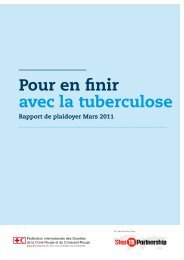Thailand - Stop TB Partnership
Thailand - Stop TB Partnership
Thailand - Stop TB Partnership
You also want an ePaper? Increase the reach of your titles
YUMPU automatically turns print PDFs into web optimized ePapers that Google loves.
participate in the preparation or review of government reports submitted to the WHO. There<br />
is currently no mechanism for civil society groups to provide independent assessments or<br />
recommendations during preparation of the Global Tuberculosis Control report on what could<br />
be done to improve the effectiveness of <strong>TB</strong> policies and services.<br />
While the WHO’s international case detection and treatment success targets are<br />
seen as helpful in motivating governments to demonstrate progress from year to year, without<br />
a transparent data collection and reporting system that allows for public review and<br />
feedback there is a strong incentive for governments to report greater progress than is<br />
actually being achieved. For example, a number of Brazilian officials and researchers have<br />
asserted that data gathered for WHO reports are not widely available at the national level; 68<br />
that Brazilian experts are unaware of the methodology by which data are collected; and<br />
that there are significant discrepancies between the information reported to the WHO and<br />
national data with regard to DOTS coverage in particular, creating an inaccurate picture of<br />
the situation on the ground. 69 As long as governments see the Amsterdam Declaration and<br />
other regional and international commitments as a useful way of attracting international<br />
funding without incurring domestic responsibility, these commitments will not spur the<br />
desired broad public mobilization that is widely acknowledged to be a prerequisite for an<br />
effective, sustained <strong>TB</strong> control effort.<br />
<strong>TB</strong> policymakers have noted the importance—and the absence—of a strong social<br />
mobilization component in <strong>TB</strong> control efforts to date. 70 There have been some incipient<br />
attempts to stimulate greater activity in this area. For example, in 2004 the <strong>Stop</strong> <strong>TB</strong><br />
<strong>Partnership</strong> formed the Advocacy, Communications and Social Mobilization Working Group.<br />
The WHO <strong>Stop</strong> <strong>TB</strong> Department has begun to collect information on advocacy efforts in<br />
high-burden countries and has promised to establish a working group that includes community<br />
participation to develop indicators for more detailed reporting on communications<br />
and social mobilization activities as well. The <strong>Stop</strong> <strong>TB</strong> <strong>Partnership</strong> has also welcomed several<br />
community-led initiatives such as the creation of a community task force to ensure<br />
representation of people living with HIV/AIDS and/or <strong>TB</strong> in all of its decision-making<br />
structures. 71 In Round Five, the Global Fund awarded substantial grants to support <strong>TB</strong> advocacy,<br />
communications, and social mobilization activities in a number of high-burden countries.<br />
Perhaps most significantly, the new Global Plan to <strong>Stop</strong> <strong>TB</strong> (2006–2015), published in<br />
March 2006, identifies the following as one of its six key elements: “Engage people with <strong>TB</strong><br />
and affected communities to demand, and contribute to, effective care, [involving] scaling<br />
up community <strong>TB</strong> care, creating demand through context-specific advocacy, communication<br />
and social mobilization; and supporting development of a patient’s charter for the tuberculosis<br />
community.” 72 However, the promise of these nascent structures and declarations<br />
of intent has yet to be fulfilled; the level of social mobilization around <strong>TB</strong> and community<br />
participation in <strong>TB</strong> policymaking processes is still inadequate.<br />
28<br />
<strong>TB</strong> POLICY IN THAILAND



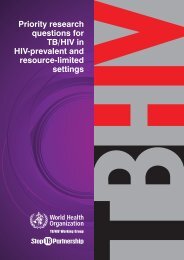
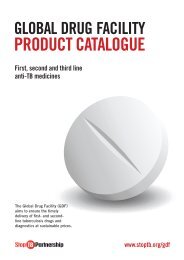
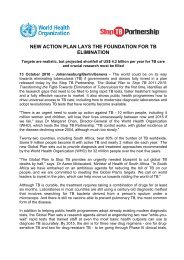
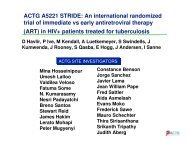
![Global Drug Facility Annual Report 2011 [.pdf] - Stop TB Partnership](https://img.yumpu.com/26788745/1/184x260/global-drug-facility-annual-report-2011-pdf-stop-tb-partnership.jpg?quality=85)

![Concept note on national stop TB partnership [.pdf]](https://img.yumpu.com/26788741/1/184x260/concept-note-on-national-stop-tb-partnership-pdf.jpg?quality=85)

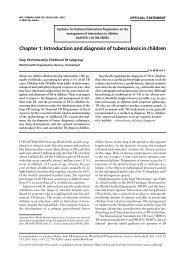
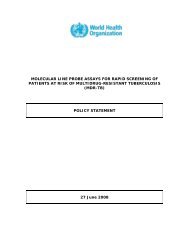
![2005 and Challenges for 2006 - 2015 [.pdf] - Stop TB Partnership](https://img.yumpu.com/26788674/1/190x245/2005-and-challenges-for-2006-2015-pdf-stop-tb-partnership.jpg?quality=85)
![Brochure (French) [.pdf] - Stop TB Partnership](https://img.yumpu.com/17234792/1/190x91/brochure-french-pdf-stop-tb-partnership.jpg?quality=85)

